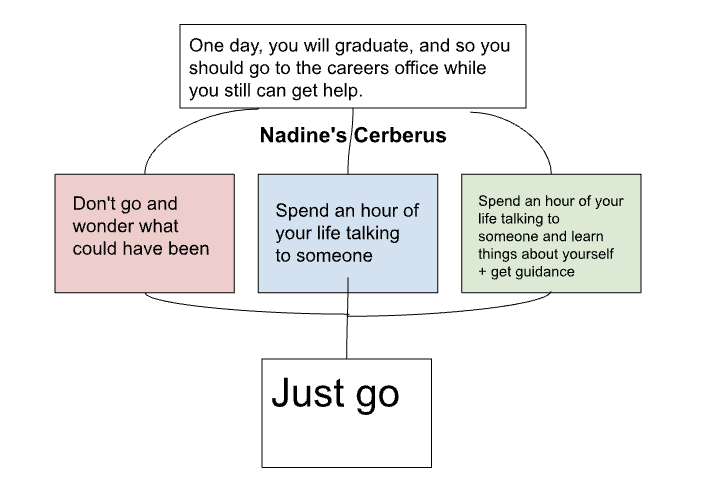For many of us, the thought of getting moots over and done with may be the only thing that will get us through the next two weeks. But, as our seniors can attest, LAWR moots are only the beginning.
Mooting is an integral part of law school and with the multitude of moot competitions available throughout the year; there is no reason why we shouldn’t moot after we’re done with LAWR. (Except maybe the fear of complete and utter humiliation. But hey, this is what you signed up for when you decided to come to law school. ;)) This inconvenient truth is why we thought we’d get advice from some of the winners of past moot competitions to put us on the path towards star mooter-dom.
In the second and final installment of Justified’s Moot Survival Kit, we asked Heidi Tan, winner of the 2011 Mallal Moots, Hannah Lee, winner of the 2013 Wong Partnership Moots, and Wesley Chan, winner of the 2012 Stamford Moots, for their thoughts on moot competitions as well as mooting in general.
Heidi Tan receiving the top prize for the 2011 Mallal Moots

Hannah Lee receiving the top prize for the 2013 WongPartnership International Commercial Arbitration Moot

Wesley Chan, on the extreme left, with the other finalists and judges of the 2012 Stamford Law Corporate Moots
How would you describe your LAWR mooting experience?
Heidi: A big relief, but an almost anti-climatic culmination of months and months of working on the same problem and issue. It felt a bit too rehearsed, because we’d gone through the same speech in practice over and over again. Sure, the refining and small tweaks along the way went miles in the actual performance, but it might have taken away a little of the thrill of being able to respond to fresh material. But I did get to wear my shiny new suit!
Hannah: My LAWR mooting experience was terrifying! My tutor was Elaine Chew, who, being an Assistant Registrar, put us through immense fear every LAWR lesson. She would grill us non-stop and was relentless in her questioning hahaha. Elaine earned quite a reputation as the “scary tutor”! That said, it is certainly insufficient to speak well; I think the skills required for mooting are vastly different. Elaine was a brilliant teacher who taught us so well and I learnt so much from her that I would unhesitatingly attribute everything I have learnt about mooting to her.
Wesley: Not great, considering I stumbled quite badly in the first minute of my submissions. I remember the judge asking me if Carlill v Carbolic had been accepted in Singapore, and then asking for the exact paragraph number in the case that applied it. On hindsight, that was a crucial learning experience. Since then, I’ve always made sure I knew my authorities inside out.
[Author’s note: As a side-note and because LAWR habits are hard to break, the case Wesley is talking about is Carlill v Carbolic Smoke Ball Company [1892] EWCA Civ 1]
What made you want to participate in moot competitions?
Heidi: I wanted something other than my abysmal grades to show internship panels that I am actually trying my best in law school 🙁
Oral advocacy is important to me as a skill set and going through the moot preparation process builds realistic expectations of how much research and analysis goes into analyzing a question before it is satisfactory to be presented to an audience — a good skill for internships!
Hannah: I simply wanted to experience the thrill of mooting outside of the classroom. To me, it was an opportunity to challenge myself, and to see how I would match up to others who enjoyed mooting as well. 🙂

Hannah challenging herself
Wesley: I figured that the stakes would be way higher once I begin working on real life cases in practice. If there was a right time for making mistakes and learning from them, it would be while still in law school. It sounds cliché but each time you moot, you really do learn a lot–from the judges’ comments or even from observing your opponent’s strengths and weaknesses. Mooting is something that you cannot mug.
Also, I like the adversarial nature of mooting. Nerves aside, you don’t get much adrenaline in daily life as a typical NUS Law student (unless you’re the kind that gets a high from reading SGCA judgments and the coda at the end).
What’s the biggest difference between LAWR and competition moots?
Heidi: Time and friends. In a competition, everything is compacted into a week or two, and you don’t have the luxury of spending months researching the issue and exploring every single angle and possible loophole. While this makes it challenging, it also makes it a lot more focused and exhilarating, and forces you to be more decisive about what is in issue and what are the red-herrings. It can also get lonely towards the later rounds as the number of participants are cut down to the final 8, 4 or 2. The journey is so much more enjoyable with friends to discuss the case with, or simply go through the same misery- combing through Manupatra at 4 in the morning is more fun with company! (Because misery loves company)
[Author’s note: Manupatra is the LawNet for Indian cases]
Hannah: The biggest difference for me, personally, is what you are gunning for in each moot. For LAWR, you are essentially just aiming for a decent grade, and it all goes towards a personal victory. In a competitive moot (WongP is my only competitive moot experience so far, so I may be wrong), a lot more considerations ride on the possibility of a triumph — you are, for example, aiming to bag a win for NUS and to make your friends and family proud of you.
Wesley: In competitions, I think it’s highly unlikely that a judge would ask you for paragraph citations. These LAWR judges don’t give chance.
Why do you think moots scare us so much? Are our fears unfounded?
Heidi: Many new mooters see the process as an inquisition. In reality, a moot is more of a conversation- an exchange of ideas between the mooter, the bench and the opposing counsel. The input of the judges and opposing counsel are just as important as your material- we often see them as disagreements to our own precious, painstakingly prepared case, which triggers the human condition to defend our stance (or discard it!).
Keeping the ultimate goal of assisting the court in this gray area of the law in mind has been helpful for me in keeping calm and my head in the game. Lighten up and have a chat with the bench, trust me they don’t bite!
And it’s okay to make mistakes, or not know the answer to some things. If the law was that clear on the issue, it wouldn’t be a moot question. The moots in which I’ve grown the most are the ones where I’ve gotten my ass completely whooped.
Hannah: Moots are petrifying because we do not have the comfort of sitting down, mulling over a problem and formulating a satisfactory answer. Instead, amidst the buzz and the unwavering glare of the judges, we are forced to take a wild plunge and verbalise an instinctive answer. I wouldn’t go so far as to say that our fears are unfounded because they are very, very real. I would say, however, that we always tend to imagine the worst and fear incessantly, but it often turns out better than we imagined it to be. 🙂
Wesley: Till today, my hands still shake when I grip the rostrum. The judges have been there before so they know how you feel. They will forgive you for stuttering. They will not forgive you for unpreparedness.

Wesley showing no sign of nerves
Did any prior experiences help you become a better mooter?
Heidi: I debated extensively throughout secondary school and JC, and I suppose it has helped me develop feelers to things like logical fallacies, rhetoric and speaking confidently in front of people I should be honoured are giving me their time of day. Yet, mooting and debating are very different and the adversarial style of debating I was so used to was more of a crutch at the beginning!
Hannah: Haha every LAWR class~
Wesley: I have 3 sisters at home.
What is your pre-moot routine? (As in what you do just before the moot begins. E.g. vocal warmups, stretches, chug red bull, etc)
Heidi: Podium makers usually manufacture for consumers whose heights are more than your average 12 year old, so I try to walk around the waiting area in my ridiculous heels while trying to balance my massive bundle of authorities file for practice.

Heidi in her killer heels
Hannah: Oh no I have no useful pre-moot routine! I usually fret around and pore through my script. Right before the WongP finals though, I simply sat down and took deep breaths. I think that really helped to calm me down and take the pressure off.
Wesley: I do my hair. The style depends on who the judge is.
If you had the opportunity to be a judge in a moot, would you take it? Why?
Heidi: You get a whole new outlook to a moot, debate or trial when you approach it wearing a different hat. My friends and I would judge each other’s moots before the actual rounds, a practice since LAWR days that we still adopt for competitive moots. I feel that it develops one’s sensitivity to matters, however minute, that the court would require assistance on, which helps you understand the requirements to build a tighter case in the future. I’ve learnt more about trial advocacy sitting on the judging bench at Open House with a very learned senior or when acting as a witness than representing as counsel.
Hannah: Why not? I have always enjoyed watching other people speak. The idea of putting them in a spot as they try to tackle your tough questions is quite tempting as well.
Do you have any mooting horror stories? If it involved yourself, how would you have avoided it?
Heidi: I once conceded my entire case in a tricky yes or no question asked by a Senior Counsel in the final seconds of my speech. While the bench knew it was a mistake and didn’t hold it against me, it was a really embarrassing one to make! So be well rested, and take all the time you need to listen to and consider questions. And look out for that cunning smile!
Hannah: Not anything specific, though terror judges who bite onto a question and refuse to move on until they get a satisfactory answer are a dime a dozen. They are simply trying to waste your time and see how you work your way out of it. Usually I will try to bridge it to the next issue — for e.g. “Your Honours, even if you are not with me on this point, it is submitted that…”. If the judges are kind, they will get the hint and let you exit gracefully.
How do I win moots too?
Heidi: I like going into moots with the attitude that my opponent is only my own previous moot performance, and the only way to win it is to do better than the last time. This way, I avoid disappointing myself too often!
I think the hardest round is always the preliminary rounds, where one has to stand out amongst 50-100 mooters to make the cut into the top 8 to even stand a fighting chance to eventually win the entire competition. Some may vehemently argue that it boils down to style, which I believe is important but is redundant without the basics of a good case. Work in teams, be open to novel arguments, let your case be completely decimated and then piece it back together again. And don’t hog or hide the Halsburys thinking it will give you an edge over the others.
Hannah: Be very, very prepared! 🙂 Be sneaky haha — plan to leave some important parts of the argument out so that if the judges probe you, you can answer the questions with ease. 🙂
Wesley: The most useful tip I’ve come across, (I’m still trying to put this into practice) is to make everything sound simple. Some good mooters I’ve observed always have simple catch-phrases that summarise their submission. Repetition is always good too, for emphasis.
Those naturally endowed with flair and/or gravitas are lucky. For those that aren’t (like me), I strongly believe that there’s nothing that preparation and practice cannot overcome. Know your case inside out.
Article contributed by Allison (Year 1)








